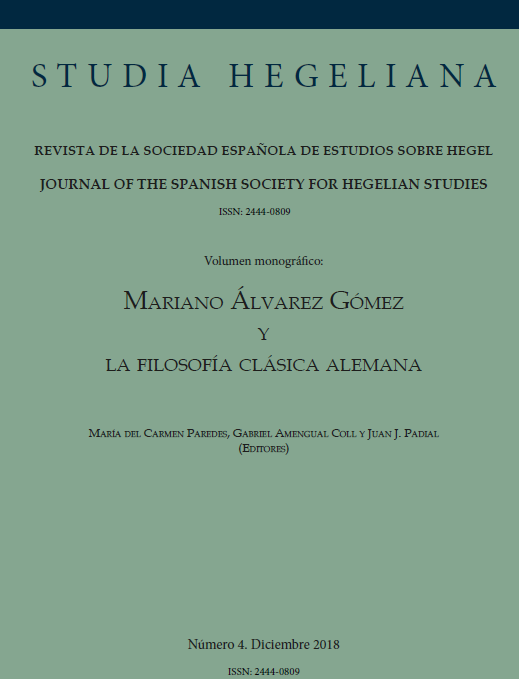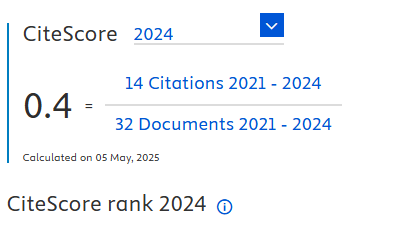Contingency, practice and political thought in Leibniz
DOI:
https://doi.org/10.24310/stheg.4.2018.11393Keywords:
LEIBNIZ, NATURAL LAW, SUBSTANCE, CONTINGENCY, ACTIONAbstract
To what extent do Leibniz’s political activities find support in his metaphysics? To answer the question it is helpful to think of his activities as a part of a “practice” in which philosophical concepts are melded with a vision of the current political situation. The context permits, requires and limits this activity. Leibniz’s Metaphysics is akin to his political activities. The paper adresses this issue taking into account the concepts of contingency and liberty, and the ways in which truths of reason found truths of fact: as manifestations of the substance and as facts that are covered by laws. Leibniz’s concept of substance implies a concept of action which implies a vision of man in God’s image, which includes political activity. On the other hand Leibniz reformulates the classical idea of natural law distinguishing three degrees: just strictum, equitas and pietas.
Downloads
Metrics
Publication Facts
Reviewer profiles N/A
Author statements
Indexed in
-
—
- Academic society
- N/A
- Publisher
- Universidad de Málaga
References
(editor) Métodos del pensamiento ontológico, Madrid: 2002 pp. 89 a 143.
Armgardt, M (2015): “Die Rechtstheorie von Leibniz im Licht seiner Kritik
an Hobbes und Pufendorf” en Wenchao Li (Hg.) “Das Recht kann nicht
ungerecht sein… “ Beiträge zu Leibniz’s Philosophie der gerechtogkeit. Studia
Leibnitiana – Sonderhefte 44. Stuttgart: 2015, p. 13.
Baruzi, J (1907): Leibniz et l’organsation relígieuse de la terre, Paris: 1907.
Basso, L (2015): “Leibniz gegen Hobbes. Zwischen Justitia und Summa Potestas”
en Peter Nitschke (Hrsg.): Gottfried W., Leibniz: Die richtige Ordnung des
Staates. Baden-Baden 2015, p. 61.
Berlin, I (1969): Four Essays on Liberty. Oxford: 1969.
Davillé (1909); Leibniz Historien. Paris: 1909
Cassirer, E.: The Philosophy of Enlightenment, Princeton: 2009.
Grua, G (1956): La justice humaine selon Leibniz, Paris: 2008.
Hunter, I.: Rival Enlightenments. Civil and Metaphysical Philosophy in early
Enlightenment Germany, Cambridge: 2001.
Leibniz (1875): Die philosophischen Schriften von G.W. Leibniz herausgegeben
von C.I Gerhardt, Berlin: 1875.
Leibniz (1923): Sämtliche Schriften und Briefe herausgegeben von der deutschen
Akademie der Wissenchaften zu Berlin. Darmstadt, 1923-1931. Berlin: 1954.
1954..y ss. Se cita esta edición con la A.
Leibniz (2015): Sur la nature de la bonté et de la justice bearbeitet von Stefan
Lucksheiter en: “Das recht kann nicht ungerecht sein…” Wenchao Li (Hg.).-
Beiträge zu Leibniz Philosophie der Gerechtigkeit. Studia Leibnitiana.
Sonderhefte 44. Stuttgart, 2015 pp. 164 a 179.
Manuel, F y Manuel, F (1979): Utopian Thought in the western World,
Harvard, 1979.
Rateau, P. (2008): La question du mal chez Leibniz. Fondements et élaboration
de la Theodicée, Paris, 2008.
Roldán, C. y Moro, O. (2009): Aproximaciones a la Contingencia, Madrid,
2009.
Salas, J de (1994): Razón y Leigitimidad en Leibniz, Madrid 1994.
Schneiders, W (1978): “Vera Política. Grundlagen der Politiktheorie bei G.W.
Leibniz” en Recht und Gesellschaft. Festschrift für Helmut Schelsky, Berlin,
1978, p. 600.
Downloads
Published
How to Cite
Issue
Section
License

This work is licensed under a Creative Commons Attribution-NonCommercial-ShareAlike 4.0 International License.
This journal provides immediate free access to its content under the principle of making research freely available to the public. All contents published in Studia Hegeliana. Journal of the Spanish Society for Hegelian Studies, are subject to the Creative Commons Attribution-NonCommercial-ShareAlike 4.0 licence (specifically, CC-by-nc-sa), the full text of which can be found at <http://creativecommons.org/licenses/by-nc-sa/4.0>. Derivative works are therefore permitted as long as they are not used for commercial purposes. The original work may not be used for commercial purposes. The journal is not responsible for the opinions expressed by the authors of the works published in it.
It is the authors' responsibility to obtain the necessary permissions for images that are subject to copyright.
Authors whose contributions are accepted for publication in this journal retain the copyright. It is non-exclusive right to use their contributions for scholarly, research and educational purposes, including self-archiving or deposit in open access repositories of any kind.
Since volume 7 of 2021 the journal Studia Hegeliana has changed the copyright. Since that year the authors have retained the copyright.
The electronic edition of this journal is published by the Editorial de la Universidad de Málaga (UmaEditorial), being necessary to cite the source in any partial or total reproduction.







244.png)






















